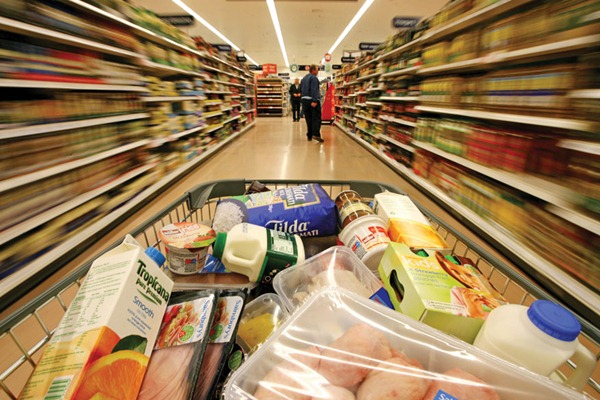Food labelling
Supermarket shelves are filled with food products claiming to make us healthy. Emma Blee speaks to two food legislation experts to find out how strict the law on food labelling is.
Chewing gum that “prevents tooth decay” and cereals that help you “lose more weight” are just some of the many health claims consumers are bombarded with every time they visit the supermarket.
It seems that an influx of these health claims has left more people confused. Across the EU, studies have shown that the number of people who read food labels is typically from 54 to 80 per cent but these numbers vary from country to country.
Studies have also shown that just a third of those who say they read the information on nutrition labels actually understand all of the information on the label.
Aideen McKevitt, a lecturer in European food regulation at the University of Ulster, explains that food scares initially prompted action on food legislation.
“Following a raft of food scares in the 1990s, there was a decline in consumer confidence about the safety of their food supply. The entire EU food regulatory system was overhauled and made more coherent,” she comments.
Food labelling is made up of both ingredient labelling and nutrition labelling. In the EU, nutrition labelling is mandatory only if the food carries a nutrition claim. However, new draft legislation could make nutrition labelling completely mandatory.
The EU looks after food labelling policy so that every member state is consistent in the messages it sends out to consumers.
McKevitt explains that some consumers may need “more education on labelling”, beginning at an early age through nutrition lessons at school, to enable them to make informed food choices. She highlights that very few consumers understand the difference between energy and calories.
Dublin-based food lawyer Ray O’Rourke thinks it is difficult to find a happy medium whereby companies in the industry and consumers are satisfied with the information carried on food labels. “It’s always a balance between marketing and consumer information,” he comments.
In 2006 the Nutrition and Health Claims Regulation was adopted to ensure that consumers are not misled by unsubstantiated, exaggerated or untruthful claims about foodstuffs. This means that food companies within the union making health claims must have scientific evidence to prove that their product actually lives up to consumer expectations.
The European Food Safety Authority (Efsa) is responsible for assessing the validity of health claims made by food manufacturers and make conclusions based on scientific evidence. These findings are sent to risk managers who work together with the EU Commission and member states. Recommendations will then be passed on to MEPs who make the legislative decisions.
Efsa has assessed more than 900 claims since October 2009 and 80 per cent of these have been rejected. There are still 3,500 claims to be assessed and it hopes to process these by the end of next year.
“The EU introduced the regulation to create a level playing field between the interests of industry and consumers,” explains O’Rourke.
He sees the legislation as having both positives and negatives: “On nutrition claims the legislation has worked. So for example, if you state that your product is ‘low-fat’ then it must contain 3g fat per 100g or 1.5g of fat per 100ml.”
However, he says health claims have been more of a problem: “Many in the industry feel that since all claims must be scientifically assessed by Efsa, it has taken too rigorous an approach to the scientific justification for such claims, treating the food products as if they are pharmaceuticals.”
McKevitt argues that it is of vital importance to food businesses to keep within food legislation as they will build up a good reputation.
“The impact of a single food safety issue would cause a decline in consumer trust and this would have a very negative effect on a food business,” she says.
In June, 559 MEPs voted in favour of proposals that food labelling should contain guideline daily amounts; 54 members voted against the plans and 32 were absent. However, the MEPs rejected proposals for a traffic-light labelling system, which uses red, amber and green symbols to indicate levels of salt, fat and other nutrients.
The new Novel Foods Regulation had its first reading in the European Parliament on 7 July. The Parliament deleted foods derived from cloned animals or their offspring from the scope of the regulation as it wants a specific law for these foods.
Just a month later it emerged that meat from the offspring of a cloned cow had entered the food chain without a licence. O’Rourke is “certain” that legislation will eventually be put in place to “provide sufficient protections to allay any ethical or consumer concerns”.
At present the Food Standards Authority (FSA) is responsible for sanctioning “novel” foods before they can be produced and sold to consumers in Northern Ireland.
There is a £5,000 fine for anyone who doesn’t seek authorisation from the FSA to produce food derived from cloned animals.
Although this might seem minimal in comparison to the money that could be made from selling on such foods, McKevitt explains that it is “in the interest of any food business operator to comply with legislation to maintain their reputation”.
She adds: “Defying the legislation will result ultimately in loss of reputation and business, which in the long term will have a negative impact on business.”
Rejected claims
• green tea is good for blood pressure, cholesterol levels, bones, teeth and eyesight or that it works as an antioxidant
• sugar-free chewing gum can reduce dental plaque
• apple cider vinegar can improve bowel movement
• the horsetail plant (Equisetum arvense L.) can help maintain normal hair
Source: Efsa







